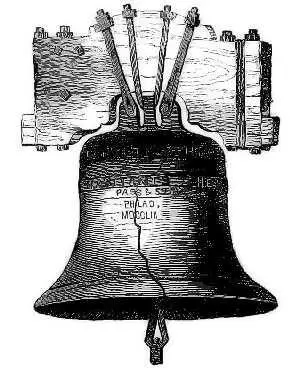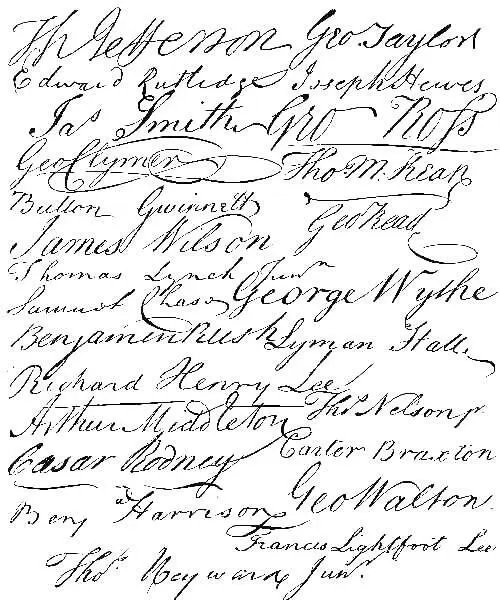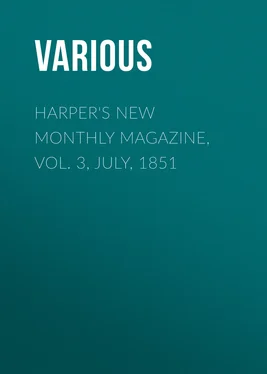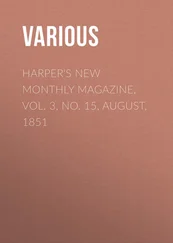Various - Harper's New Monthly Magazine, Vol. 3, July, 1851
Здесь есть возможность читать онлайн «Various - Harper's New Monthly Magazine, Vol. 3, July, 1851» — ознакомительный отрывок электронной книги совершенно бесплатно, а после прочтения отрывка купить полную версию. В некоторых случаях можно слушать аудио, скачать через торрент в формате fb2 и присутствует краткое содержание. Издательство: Иностранный паблик, Жанр: foreign_antique, periodic, foreign_edu, на английском языке. Описание произведения, (предисловие) а так же отзывы посетителей доступны на портале библиотеки ЛибКат.
- Название:Harper's New Monthly Magazine, Vol. 3, July, 1851
- Автор:
- Издательство:Иностранный паблик
- Жанр:
- Год:неизвестен
- ISBN:нет данных
- Рейтинг книги:3 / 5. Голосов: 1
-
Избранное:Добавить в избранное
- Отзывы:
-
Ваша оценка:
- 60
- 1
- 2
- 3
- 4
- 5
Harper's New Monthly Magazine, Vol. 3, July, 1851: краткое содержание, описание и аннотация
Предлагаем к чтению аннотацию, описание, краткое содержание или предисловие (зависит от того, что написал сам автор книги «Harper's New Monthly Magazine, Vol. 3, July, 1851»). Если вы не нашли необходимую информацию о книге — напишите в комментариях, мы постараемся отыскать её.
Harper's New Monthly Magazine, Vol. 3, July, 1851 — читать онлайн ознакомительный отрывок
Ниже представлен текст книги, разбитый по страницам. Система сохранения места последней прочитанной страницы, позволяет с удобством читать онлайн бесплатно книгу «Harper's New Monthly Magazine, Vol. 3, July, 1851», без необходимости каждый раз заново искать на чём Вы остановились. Поставьте закладку, и сможете в любой момент перейти на страницу, на которой закончили чтение.
Интервал:
Закладка:
"He is at this time transporting large armies of foreign mercenaries to complete the works of death, desolation, and tyranny, already begun, with circumstances of cruelty and perfidy scarcely paralleled in the most barbarous ages, and totally unworthy the head of a civilized nation.
"He has constrained our fellow-citizens, taken captive on the high seas, to bear arms against their country, to become the executioners of their friends and brethren, or to fall themselves by their hands.
"He has excited domestic insurrections among us, and has endeavored to bring on the inhabitants of our frontiers the merciless Indian savages, whose known rule of warfare is an undistinguished destruction of all ages, sexes, and conditions.
"In every stage of these oppressions, we have petitioned for redress in the most humble terms. Our repeated petitions have been answered only by repeated injury. A prince, whose character is thus marked by every act which may define a tyrant, is unfit to be the ruler of a free people.
"Nor have we been wanting in attentions to our British brethren. We have warned them, from time to time, of attempts, by their legislature, to extend an unwarrantable jurisdiction over us. We have reminded them of the circumstances of our emigration and settlement here. We have appealed to their native justice and magnanimity, and we have conjured them, by the ties of our common kindred, to disavow these usurpations, which would inevitably interrupt our connections and correspondence. They, too, have been deaf to the voice of justice and of consanguinity. We must, therefore, acquiesce in the necessity which denounces our separation, and hold them, as we hold the rest of mankind, enemies in war, in peace friends.
"We, therefore, the representatives of the United States of America, in general Congress assembled, appealing to the Supreme Judge of the World for the rectitude of our intentions, do, in the name, and by the authority of the good people of these colonies, solemnly publish and declare that these united colonies are, and of right ought to be free and independent states; that they are absolved from all allegiance to the British crown, and that all political connection between them and the state of Great Britain is, and ought to be, totally dissolved; and that, as free and independent states, they have full power to levy war, conclude peace, contract alliances, establish commerce, and to do all other acts and things which independent states may of right do. And for the support of this Declaration, with a firm reliance on the protection of Divine Providence, we mutually pledge to each other our lives, our fortunes and our sacred honor."

LIBERTY BELL.
It was almost two o'clock in the afternoon when the final decision was announced by Secretary Thomson, to the assembled Congress in Independence Hall. It was a moment of solemn interest; and when the secretary sat down, a deep silence pervaded that august assembly. Tradition says that it was first broken by Dr. Franklin, who remarked, "Gentlemen, we must now all hang together, or we shall surely hang separately." Thousands of anxious citizens had gathered in the streets of Philadelphia, for it was known that the final vote would be taken on that day. From the hour when Congress convened in the morning, the old bell-man had been in the steeple. He had placed a boy at the door below, to give him notice when the announcement should be made. As hour succeeded hour, the graybeard shook his head, and said, "They will never do it! they will never do it!" Suddenly a loud shout came up from below, and there stood the little blue-eyed boy clapping his hands, and shouting, "Ring! Ring!" Grasping the iron tongue of the old bell, backward and forward he hurled it a hundred times, its loud voice proclaiming "Liberty throughout all the land unto all the inhabitants thereof." 2 2 The history of this bell, now hanging in the steeple of the State House, in Philadelphia, is interesting. In 1753, a bell for that edifice was imported from England. On the first trial ringing, after its arrival, it was cracked. It was recast by Pass and Stow, of Philadelphia, in 1753, under the direction of Isaac Norris, the then Speaker of the Colonial Assembly. Upon fillets around its crown, cast there twenty-three years before the Continental Congress adopted the Declaration of Independence, are the words of Holy Writ, "Proclaim liberty throughout all the land unto all the inhabitants thereof." How prophetic! Beneath that very bell the representatives of the thirteen colonies "proclaimed liberty throughout all the land," and its iron tongue echoed the annunciation! For more than two hours its glorious melody floated clear and musical as the voice of an angel above the discordant chorus of booming cannon, rolling drums, and the mingled acclamations of an excited multitude. It, too, was fractured, and for long years its voice has been silent. When I stood in the belfry and sketched this portrait of the old herald, the spirit of the Past, with all its retinue, seemed to be there, for association summoned to the audience chamber of imagination, from the lofty hills and green valleys of the Republic, that band of patriots who stood sponsors at its baptism in 1776.
The excited multitude in the streets responded with loud acclamations, and with cannon peals, bonfires, and illuminations, the patriots held a glorious carnival that night in the quiet city of Penn.
The Declaration of Independence was signed by John Hancock, the President of Congress, only, on the day of its adoption, and thus it went forth to the world. Congress ordered it to be entered at length upon the journals; it was also ordered to be engrossed upon parchment for the delegates to sign it. This last act was performed on the second day of August ensuing, by the fifty-four delegates then present. Thomas M'Kean, of Delaware, and Dr. Thornton, of New Hampshire, subsequently signed it, making the whole number fifty-six. Upon the next two pages are their names, copied from the original parchment, which is carefully preserved in a glass case, in the rooms of the National Institute, Washington City. It is our pride and righteous boast, and it should be the pride and boast of mankind, that not one of those patriots who signed that manifesto ever fell from the high moral elevation which he then held: of all that band, not one, by word or act, tarnished his fair fame.
The great Declaration was every where applauded; and, in the camp, in cities, villages, churches, and popular assemblies, it was greeted with every demonstration of joy. Washington received it at head-quarters, in New York, on the ninth of July, and caused it to be read aloud at six o'clock that evening at the head of each brigade. It was heard with attention, and welcomed with loud huzzas by the troops. The people echoed the acclaim, and on the same evening they pulled down the leaden statue of the king, which was erected in the Bowling-Green, at the foot of Broadway, in 1770, broke it in pieces, and consigned the materials to the bullet-moulds.
SIGNATURES ON THE DECLARATION OF INDEPENDENCE.
At noon, on the seventeenth of July, Colonel Crafts read the Declaration to a vast assemblage gathered in and around Faneuil Hall, in Boston, and when the last paragraph fell from his lips, a loud huzza shook the old "Cradle of Liberty." It was echoed by the crowd without, and soon the batteries on Fort Hill, Dorchester, Nantasket, Long Island, the Castle, and the neighboring heights of Charlestown, Cambridge, and Roxbury boomed forth their cannon acclamations in thirteen rounds. A banquet followed, and bonfires and illuminations made glad the city of the Puritans.

SIGNATURES ON THE DECLARATION OF INDEPENDENCE.
Читать дальшеИнтервал:
Закладка:
Похожие книги на «Harper's New Monthly Magazine, Vol. 3, July, 1851»
Представляем Вашему вниманию похожие книги на «Harper's New Monthly Magazine, Vol. 3, July, 1851» списком для выбора. Мы отобрали схожую по названию и смыслу литературу в надежде предоставить читателям больше вариантов отыскать новые, интересные, ещё непрочитанные произведения.
Обсуждение, отзывы о книге «Harper's New Monthly Magazine, Vol. 3, July, 1851» и просто собственные мнения читателей. Оставьте ваши комментарии, напишите, что Вы думаете о произведении, его смысле или главных героях. Укажите что конкретно понравилось, а что нет, и почему Вы так считаете.












